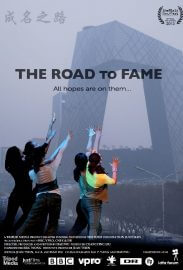
https://www.filmplatform.net/product/road-fame
China’s top drama academy stages the American musical “Fame”—China’s first official collaboration with Broadway—as the graduation showcase for its senior class. During the eight-month rehearsal, five students compete for roles, struggle with pressure from family and authority, and prepare to graduate into China’s corrupt entertainment industry.
Part of China’s single-child generation, they were spoiled growing up but are now obliged to carry on the failed dreams of their parents.

Director’s Statement
As a filmmaker who has grown up in both China and America, I often find myself disenchanted with media’s tendency to portray China as a culture, a society and a people distinct from the West. Thus my creative efforts have focused on challenging the stereotypes and introducing the complexities of modern China.
With The Road to Fame, I started out making a film about how the cultural idea of fame would transform when Fame, a quintessential story about the “American dream,” was produced in China at China’s own Fame school. As filming went on, however, my interest and focus gradually shifted to the Single-Child generation and their “Chinese dream.”
“Chinese dream” is a new political slogan introduced by the government in 2012 to rally its increasingly restless population. After thirty-plus years of reform and economic expansion, Chinese society is suffering from growing conflicts between the rich and the poor, opportunities and corruption, and aspirations and anxieties. The new slogan is part of the government’s effort to control the divergent aspirations and maintain social stability.
But beyond the official propaganda, how do young people in China define and go about realizing their individual “Chinese dream”? What are their own weaknesses and the external constraints holding them back? What do their dreams say about China today, and how will their efforts pursuing these dreams shape China’s future?
These are the questions that I ended up exploring with The Road to Fame. By telling the dreams of five Chinese college students and their parents, I would like to show that the stories of coming of age, of dreams, are culturally specific, but at the same time universal. I would like to provide viewers with an intimate picture of the aspirations and the anxieties of Chinese youths, and of a China in transition.
The School
At the founding of the People’s Republic in 1949, the Chinese government merged three established performing art schools into the Central Academy of Drama. Since then, the Academy has been considered China’s premier acting school. Most of China’s best-known international stars—including Gong Li, Zhang Ziyi and Jiang Wen—graduated from there.
However, today a degree from the Academy no longer guarantees a job, let alone fame. In the 1990s, the government phased out the planned-economy policy of assigning jobs to college graduates. It also dramatically expanded college enrollment across all disciplines. Meanwhile, young people started chasing the glamour of show business en mass. The pool of acting talent has thus grown much faster than what the industry can absorb. Industry anecdote pegs the number of actors in Beijing at between 300,000-400,000.
The Chinese Production of FAME
Fame started as the critically acclaimed 1980 movie and later moved to commercial success on TV and the theater stage. The film tells the story of students at the New York High School of Performing Arts striving for success and fame. It has become a pop culture icon in the West because it appeals to the classic American myth of individualism and of the “self-made-person.”
In 2008, the Central Academy of Drama sought help from Broadway to stage the first Western musical in Chinese. As China’s economy continues its meteoric rise, the government has begun investing heavily in creative industries to enhance its “soft power.” Developing local musical industry and talents becomes part of the endeavor.
The Academy’s American partners suggested Fame – the Musical due to the story’s relevance to the Chinese students. The majority of the funding came from the state. The show was co-produced with Nederlander Worldwide Entertainment and Phoenix Entertainment. It was China’s first official co-production with Broadway.
In 1979, China began enforcing the One-Child policy nationwide, allowing most couples to have only one child. The policy has helped check China’s population growth. But it has also brought wide-ranging impact to Chinese society.
Between 1980 and 1990, approximately 240 million babies were born. The entire generation grew up with no siblings and were often spoiled by two parents and four grandparents.
They are also the first generation in China to enjoy uninterrupted economic prosperity since the 1842 Opium War. While their parents suffered through famine, political instability and lack of proper education under Mao Zedong, these single children embrace pop culture and Western-style consumerism. They are savvy with the Internet and digital media. And they have high expectations of material wealth and individual fulfillment.
But the future scares them. For the senior students at the Academy, China’s show business appears ruthlessly competitive, mercenary and corrupt. Meanwhile, they are under tremendous pressure from their parents to succeed. The parents have invested much of their financial resources and their own failed dreams in their only children. Filial piety and family honor therefore constrain the kids’ capability to dream for themselves.
It is in this environment that our five characters grow increasingly anxious and distrustful of their teachers, the school, and the society at large. They come from diverse family background, have contrasting personalities, and harbor different career goals. They struggle with the various cultural values shaping China today—Confucianism, individualism and materialism—and seek guidance from the American coaches to find their own voices. They strive to control their own fate while doing their best to make their parents proud. In the pursuit of Fame on and off stage, they learn to both compromise and persevere on the path to their dreams.